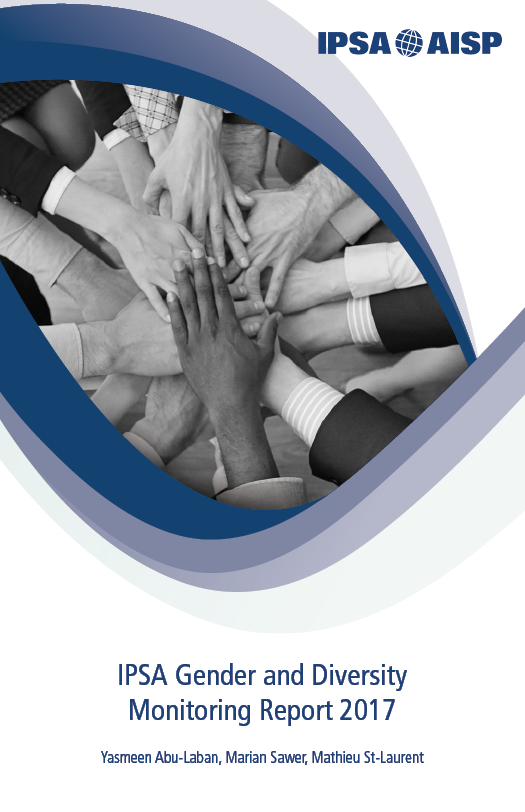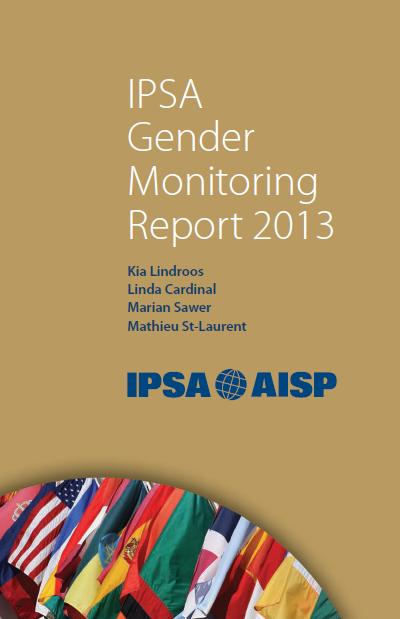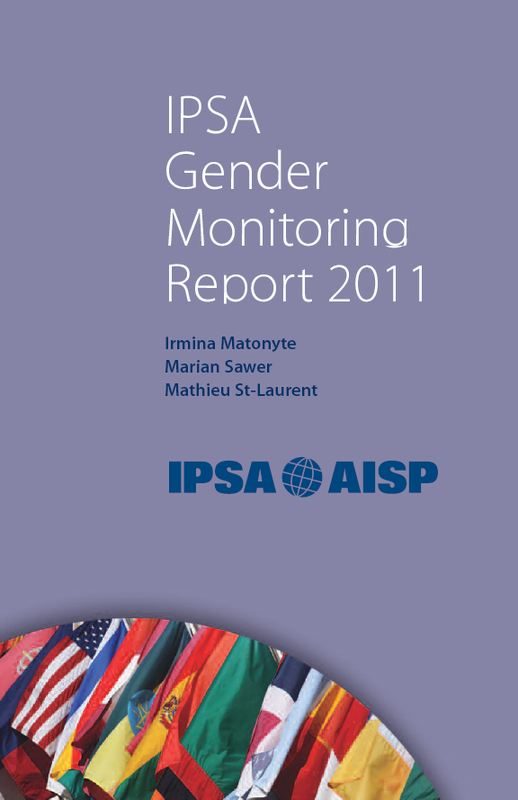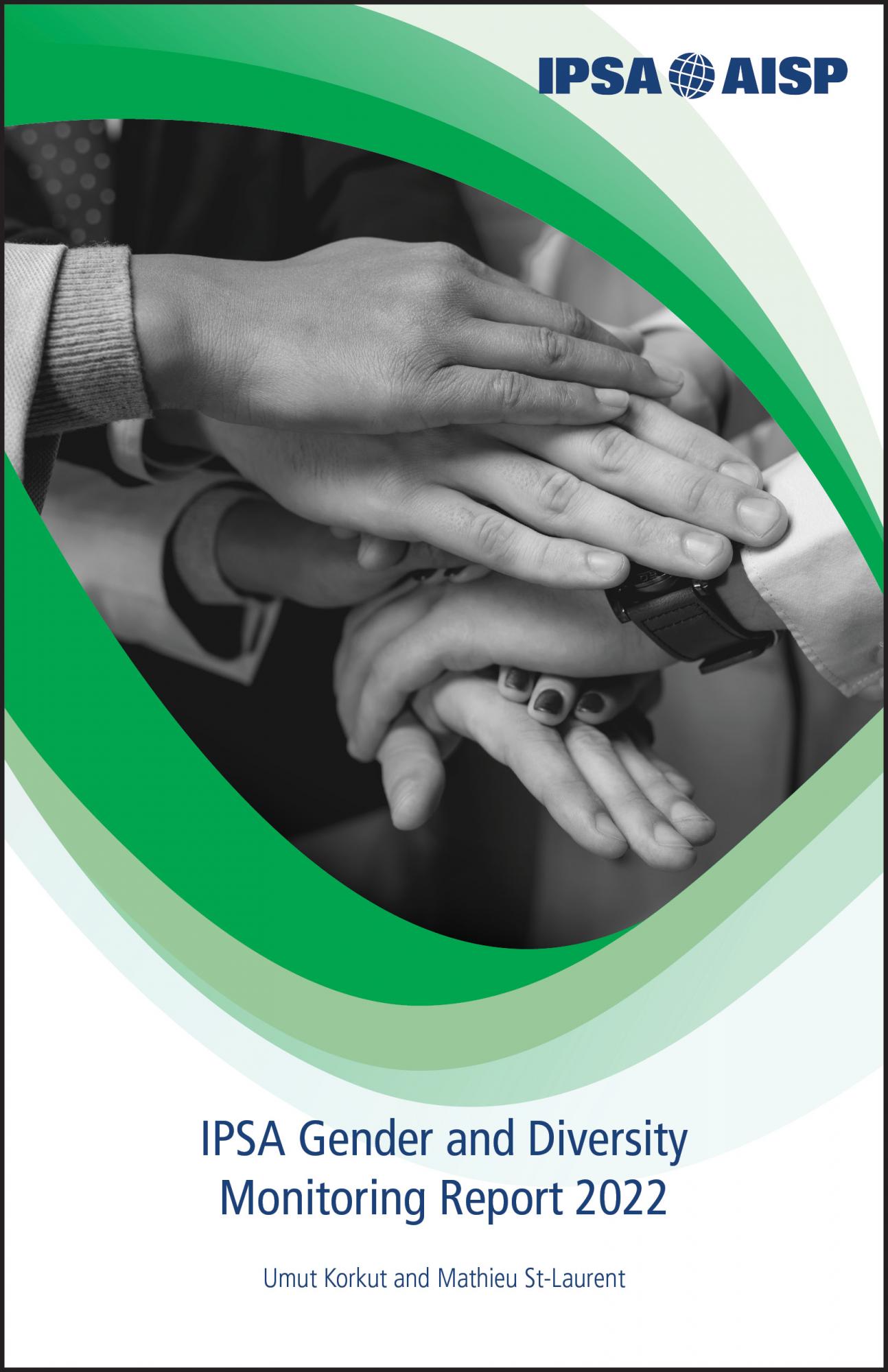Since women have long been under-represented in the membership and senior levels of political science associations, IPSA has decided in 2009 to establish a gender monitoring system to track the status of women in political science. The gender monitoring survey of national associations is conducted under the aegis of the IPSA Committee on Participation and Membership, with the assistance of the IPSA Secretariat. This initiative has been discussed at length, and the questionnaire was first sent to national PSAs in 2011. While information on participation in political science among women is already available in a number of countries, the IPSA survey is the first to provide substantial comparative data from all continents.
A key aim of this gender monitoring process is to raise awareness of ongoing under-representation among women and call attention to issues of gender equality among member associations. The establishment of a gender monitoring system for IPSA member organizations will allow us to gather comparative data on the status of women and men in IPSA member organizations and to identify examples of best practices that promote equal opportunity for both sexes and under-represented groups in academic political science. This database will help member organizations identify areas requiring further action and advance recommendations concerning potential courses of action.
IPSA’s ultimate objective, with this initiative, is to strengthen the role of women in scientific research and organizations. It is important to emphasize that the survey results will be used not only to specify the role of female political scientists but also to assess the status of the broader political science community. To achieve this, IPSA needs the support of its constituents, starting with the national and regional political science associations and the research committees. This survey is designed to be part of an ongoing project meant to evaluate the progress of female scholars in national and regional associations. Our goal is to present these survey results (also surveying on diversity since 2017) every four years in conjunction with the IPSA World Congress of Political Science.
IPSA Gender and Diversity Monitoring Report 2022
This fourth survey was conducted by IPSA in early 2023. A total of 34 out of the 59 regional and national political science associations (PSAs) affiliated with IPSA responded. Although not all PSAs responded, it should be noted that responses came from all continents and from most of the major associations, providing a comprehensive picture of gender and diversity as part of the global political science community. Most responded to all of the survey questions regarding the breakdown of membership by gender.
Due to the necessity to generate comparative data on gender and diversity monitoring in the global political science community, the 2022 survey retained all of the questions from the 2017 survey on gender and diversity balance in membership, leadership positions in PSAs, conference participation, and, where applicable, in the editorship of journals published by PSAs. Information was also sought on whether PSAs had a women's caucus, a specialty group dedicated to the study of gender and politics, or other working groups related to gender and the profession.
The 2022 survey also asked whether information was collected on religion, race/ethnicity, language, and indigeneity. The survey asked whether PSAs have policies or standing committees that address these forms of diversity, and what they consider to be successful practices for promoting equity with respect to these forms of diversity. There were two new additions to this 2022 survey, LGBT+ and disability, in terms of understanding whether or not PSAs collected membership data on these characteristics of their members.
As in the 2017 survey, the overall responses are uneven, as some countries have yet to address issues related to gender and other forms of diversity. In addition, the national collection of information on the membership of the association/discipline is also uneven. Nevertheless, some PSAs appear to be leading the way in terms of the importance that the association attaches to gender and diversity issues. This report highlights these cases of good practices.
Our analysis of the 2022 survey and trends in PSAs, as well as in IPSA, suggests that there has been progress in the representation of women and diversity as members in professional political science associations, in addition to their presence in the discipline as active and recognized researchers and leaders. Since the 2017 report, there has been an increase in the number of leadership roles held by women in PSAs. However, their leadership numbers are still not equal to their male counterparts, and numerous associations have yet to elect their first female president or ensure gender parity in panel composition.
As IPSA and many PSAs also increasingly consider diversity issues such as race/ethnicity and indigeneity, as well as LGBT+ and disability, the time is ripe for an expanded and ongoing global discussion. Associations should consider collecting better data on who their members are and what types of diversity characteristics they represent. The findings of this fourth IPSA Gender and Diversity Monitoring Report are important in highlighting the ways in which attention to gender and gender equality is linked to building an inclusive discipline globally. While the successes noted are uneven, the trend towards greater inclusion has clearly benefited from the discussion and implementation of institutional mechanisms attuned to gender and diversity equality. The findings and analysis in this report provide guidance on how both IPSA and the PSAs can promote greater inclusion in the years ahead.
IPSA Gender and Diversity Monitoring Report 2022 PDF
IPSA Gender and Diversity Monitoring Report 2017
 This survey was conducted by IPSA during late 2017 and early 2018. Of the 55 national political science associations (PSAs), that are affiliated to IPSA, responses were received from 33. Most provided answers to all of the survey questions concerning the breakdown of membership along gender lines and leadership positions taken in relation to initiatives promoting equal opportunity. The results of this third survey was presented at the 2018 IPSA World Congress in Brisbane.
This survey was conducted by IPSA during late 2017 and early 2018. Of the 55 national political science associations (PSAs), that are affiliated to IPSA, responses were received from 33. Most provided answers to all of the survey questions concerning the breakdown of membership along gender lines and leadership positions taken in relation to initiatives promoting equal opportunity. The results of this third survey was presented at the 2018 IPSA World Congress in Brisbane.
The 2017 survey asked questions pertaining to gender balance in relation to membership, leadership positions in the PSA, conference participation, and where relevant, in the editorships of journals published through PSAs.
Information was also sought on whether PSAs had a women’s caucus, a specialist group devoted to the research study of gender and politics, or other working groups pertaining to gender and the profession. Additionally, the 2017 survey sought to uncover practices concerning the promotion of equal opportunities for both women and men.
The 2017 survey further asked whether information was collected on religion, race/ethnicity, language and where pertinent, Indigeneity (since not all PSAs defined their country as having Indigenous peoples). The survey probed whether PSAs had policies or standing committees dealing with these forms of diversity, and what they viewed as successful practices for promoting equity in relation to these forms of diversity.
Survey responses overall show unevenness, as in some countries issues relating to gender and other forms of diversity have yet to be addressed; moreover, the national collection of information on members of the association/discipline is also uneven. The size of association varies greatly, ranging from 45 (Croatian and Tunisian PSAs) to 10,595 (American PSA).
Interestingly, we also observe that national PSAs that have undertaken explicit measures in relation to women are more likely to undertake initiatives for other groups, suggesting that attention to gender equity creates a climate in which attention to diversity and equal opportunities expand for political scientists. This finding may serve to stimulate reflection and discussion of what appear to be expanding and reverberating benefits to ensuring that women and other historically marginalized groups are fully included in the profession.
Executive Summary
English - français - español - العربية - 中国 - русский - 日本語 - हिंदी - 한국어
Full Report (in English)
IPSA Gender and Diversity Monitoring Report 2017 PDF
IPSA Gender Monitoring Report 2013
 The survey was conducted by IPSA from December 2013 to May 2014. A total of 38 of the 52 national political science associations (PSAs) responded. Most provided answers to all of the survey questions concerning the breakdown of membership along gender lines and leadership positions taken in relation to initiatives promoting equal opportunity. The results of this second survey was presented at the 2014 IPSA World Congress in Montreal.
The survey was conducted by IPSA from December 2013 to May 2014. A total of 38 of the 52 national political science associations (PSAs) responded. Most provided answers to all of the survey questions concerning the breakdown of membership along gender lines and leadership positions taken in relation to initiatives promoting equal opportunity. The results of this second survey was presented at the 2014 IPSA World Congress in Montreal.
The data provides a compelling picture of national variations in the participation of women in political science and of the steps taken by national associations to address gender issues. In some countries, extensive research has been conducted to determine why the progress of women has stalled, and the following problems were identified: “the leaky pipeline,” “the normative political scientist” and the “chilly climate” (Cowden et al. 2012). In other countries, it seems, there is a lack of awareness concerning the under-representation of women in the field. We hope that comparative data on participation and examples of best practices for addressing these gender-related issues will spark further reflection within national associations on how to foster a fully inclusive profession.
IPSA Gender Monitoring Report 2013 PDF
IPSA Gender Monitoring Report 2011
 The survey was conducted by IPSA from August to November 2011. A total of 38 of the 50 national political science associations (PSAs) responded. Most provided answers to all of the survey questions concerning the breakdown of membership along gender lines and leadership positions taken in relation to initiatives promoting equal opportunity. The results of this initial survey was presented at the 2012 IPSA World Congress in Madrid.
The survey was conducted by IPSA from August to November 2011. A total of 38 of the 50 national political science associations (PSAs) responded. Most provided answers to all of the survey questions concerning the breakdown of membership along gender lines and leadership positions taken in relation to initiatives promoting equal opportunity. The results of this initial survey was presented at the 2012 IPSA World Congress in Madrid.
The data provides a compelling picture of national variations in the participation of women in political science and of the steps taken by national associations to address gender issues. In some countries, extensive research has been conducted to determine why the progress of women has stalled, and the following problems were identified: “the leaky pipeline,” “the normative political scientist” and the “chilly climate” (Cowden et al. 2012). In other countries, it seems, there is a lack of awareness concerning the under-representation of women in the field. We hope that comparative data on participation and examples of best practices for addressing these gender-related issues will spark further reflection within national associations on how to foster a fully inclusive profession.
IPSA Gender Monitoring Report 2011 PDF












